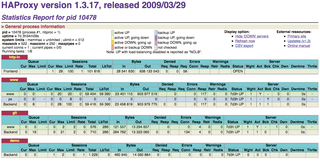
By Charly Kühnast
Linux has no lack of free load balancers. Previously, I talked about Pen [1], which you can set up in a couple of minutes, and Pound [2], which is world famous. However, the high flyer in the balancer scene, HAProxy [3], has thus far led a fairly secluded life as an "Unknown Stuntman" [4]. The HAProxy balancer can handle any aspect of the proxy business - yet nobody has heard of it. The program's author, Willy Tarreau, has successfully demonstrated his competence as the maintainer of the 2.4 kernel, but it doesn't look as if userspace software users are interested in taking his offerings.
HAProxy uses a single thread - multithreading is for the timid. Tarreau's single-thread approach offers the decisive benefits of low overhead and high speed but requires meticulous care on the part of the developer. The single thread can go down because of a single error - a memory leak or a race condition, for example - and then the stuntman takes a tumble without a safety net.
The lack of fame could be due to HAProxy's configuration file, which is far more bulky than its competitors; however, it definitely is not from poor performance. Tarreau's profound knowledge of the Linux kernel is evident in the proxy's development history, and polling provides a great example of this. The earliest versions of polling still used select(), which tends to be fairly lethargic when faced with a larger number of open file descriptors. The function was replaced by calls to poll(), which in turn was ousted by epoll().
The brand new splice() transports data between two interfaces, and this beams HAProxy into the league of two-figure gigabyte peak performers. Tarreau also proudly points to reference applications that permanently shovel between 2 and 3GB through his balancer.
I can find no real reason to be afraid of lengthy configuration files. Although I am allowed to tweak the settings, the basic setup for balancing between two web servers is pleasingly simple, as you can see from Listing 1. Admittedly, this is a simple task for the HAProxy balancer, yet stuntmen are used to hiding their light under a bushel to make the star of the show look better.
| Listing 1: /etc/haproxy/haproxy.cfg |
01 global 02 maxconn 16000 03 ulimit-n 65536 04 05 user haproxy 06 group haproxy 07 08 daemon 09 nbproc 1 10 pidfile /var/run/haproxy.pid 11 12 listen http 0.0.0.0:80 13 mode http 14 option httplog 15 balance roundrobin 16 server www1 192.168.1.20:80 check 17 server www2 192.168.1.21:80 check |
| INFO |
|
[1] Pen: http://siag.nu/pen/
[2] Pound: http://www.apsis.ch/pound/ [3] HAProxy: http://haproxy.1wt.eu [4] Lee Majors, The Unknown Stuntman: http://www.youtube.com/watch?v=-3CXp54h4ew |
| THE AUTHOR |
|
Charly Kühnast is a Unix operating system administrator at the Data Center in Moers, Germany. His tasks include firewall and DMZ security and availability. He divides his leisure time into hot, wet, and eastern sectors, where he enjoys cooking, fresh water aquariums, and learning Japanese, respectively. |